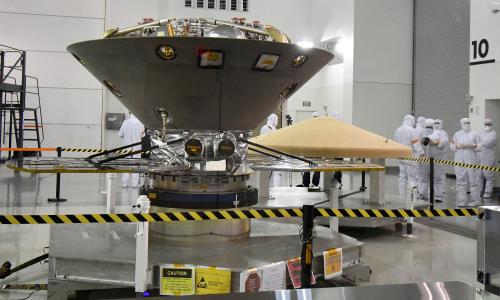There is lots of military work to do in space, and yes, we need to devote more military attention and resources to this region. But a Space Force is not the best solution to this problem, writes Michael O’Hanlon. This piece originally appeared as an op-ed in The Washington Post.
With the Trump administration and thus the Pentagon now firmly behind it, and with Americans naturally predisposed to new high-tech frontiers, the proposal to create a Space Force within the U.S. military now has lots of momentum. But Congress, which must approve the plan before the new military service is created, should say no to this alluring, misguided idea.
Some of the arguments against a Space Force, which would be bureaucratically positioned within the Department of the Air Force, just as the Marine Corps is technically part of the Department of the Navy, are mundane and largely about economics and efficiency. Others are more conceptual and strategic. Together, they add up to a strong case for skepticism.
First, the Space Force would be not just small relative to any other service but tiny. It would consist of perhaps 15,000 to 20,000 personnel, including civilians. By contrast, the Marine Corps, far and away the smallest of military services, has about 185,000 active-duty Marines. Even the Coast Guard, within the Department of Homeland Security, has more than 40,000 active-duty personnel and a grand total of nearly 90,000 employees.
Because a stand-alone military service, even if within the Air Force, will need its own hierarchy, doctrine, schools, uniforms and everything else under the sun that goes with a stand-alone organization — including, perhaps, marching bands — we will spend lots of time in the early years simply building it, at a cost the Pentagon estimates at $2 billion over five years (which seems a lowball estimate).
The experience of building other new governmental organizations should make us wary of bureaucratically reorganizing our way to a new national priority. Yes, space is a priority for the armed forces, and yes, space is a dynamic theater where adversaries are increasingly active. But after 9/11, we similarly agreed to create a Department of Homeland Security. Nearly two decades later, the verdict is still out about the wisdom of that move.
Already, the nation’s top military advisory body, the Joint Chiefs of Staff, has seven members — the chairman, vice chairman, head of each of the four Defense Department services and head of the National Guard Bureau. This group does not need an eighth member and eighth separate military advisory voice.
Proponents of the Space Force argue that such a branch would be necessary to promote space-related defense projects and technology. While the Air Force does tend to be run by fighter pilots who often emphasize jet technology, it also has an institutional proclivity to play down the importance of bomber forces, unmanned systems and other technologies. The Navy might similarly overemphasize aircraft carriers while underemphasizing unmanned systems. But we cannot create a new service for each partially neglected area of the armed forces.
The best solution is for civilians, and the chairman and vice chairman, to take more of a role in promoting officers within the existing services who have a variety of specialties, and for Congress to properly fund the full range of military priorities. We have seen this approach work in the past, even with less sexy areas of technology such as long-range transport aircraft. It can work for space, too.
The Trump administration is right to create a new space command — that is, a unified headquarters of perhaps 500 to 1,000 people from across the military services who will specialize in space operations, which have in fact become much more important over the years. But Space Command will likely work best if its personnel also have strong ties to the military services, since each service ultimately depends upon the sensors, communications systems and networks operating in and through space. Integration should be the watchword.
Space systems are increasingly vulnerable today, and while we can mitigate this trend by dispersing more capabilities across large numbers of smaller satellites, space will never again be a military sanctuary. As such, most space systems today need backups of one type or another that would operate in the air or another medium closer to Earth. Again, integration of space capabilities with other assets should be the watchword. Creating a new bureaucracy might run counter to this by increasing stovepiping rather than teamwork.
U.S. military services all have strong warrior cultures that emphasize offensive weapons and decisive lethal operations. This is as it should be. But it is not clear that the same attitude is optimal for space operations. While we should assume that adversaries will target our satellites in war — and while we need ways to counter theirs, too — we should attempt restraint wherever possible in weaponizing space, which is still humanity’s last great frontier and serves the U.S. military best as a region for creating and transmitting data rather than fighting. Creating a Space Force might run counter to this goal.
Yes, there is lots of military work to do in space, and yes, we need to devote more military attention and resources to this region. But a Space Force is not the best solution to this problem.
The Brookings Institution is committed to quality, independence, and impact.
We are supported by a diverse array of funders. In line with our values and policies, each Brookings publication represents the sole views of its author(s).










Commentary
The Space Force is a misguided idea. Congress should turn it down.
April 20, 2019